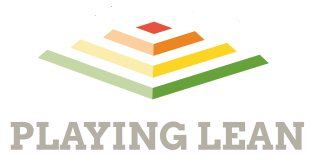If you have played Playing Lean before you remember “Company Cards”. Company Cards are the predefined contextual setting of the game: Four social media startups in recent history, Friendsta, Twitbook, FaceSpace, and MySnap. These are used because the developers of the game anticipated that most players would recognize and have some knowledge of the case.
Company Cards are great examples to form Positioning Statements.
Let’s say you have an idea for a new product or service. Before you start making experiments you should make a positioning statement. In this you identify your target customer, make a statement of the need or opportunity that your product addresses and put it in the context of how your customer alternatively seeks to solve this problem.
Let’s put it into a formula:
For (target customer)
Who (statement of the need or opportunity)
The (product name) is a (product category)
That (key benefit)
Unlike (primary competitive advantage)
Our Product (statement of primary differentiation)
Difficult? Don’t worry we will untangle it through the examples of the company cards. Let’s start with Friendster
Friendster
Friendster is considered to be the “grandfather” of social networks, although smaller attempts were launched earlier. It was the first to reach one million users.
Positioning statement:
For single people
Who want to make new connections
Friendster is a social network
that offers the opportunity to meet friends of your friends.
Unlike other social networks
our product validates profile images of users.
Getting it? Good.
Friendster ran into serious technical issues and was slowly taken over by other rising social networks, like...
Myspace
Myspace started out as a clone of Friendster’s most popular features. It is an internal startup within eUniverse, first version built in 10 days Bigger than Google in 2006, and passed by Facebook in 2009.
So what can be the Positioning statement of Myspace?
For young people who want to really express themselves online, MySpace is a social network that offers the opportunity to connect. Unlike Friendster, our product allows users to customize their page.
The website where you spend most of your internet-time sprang out of the Harvard University. Mark Zuckerberg and the other founders were excellent developers.
Positioning statement for Facebook:
For Harvard graduate students who want to improve their network, Facebook is a social network that offers the opportunity to connect. Unlike other social networks Facebook has excellent developers and a lean way of continuously improving their website.
Well, as you experienced Facebook grew well beyond the alumni of Harvard. After rolling out to many universities, it launched to the general public and since acquired more than 1,4 billion users.
Launched in 2006 Twitter was a pivot of the podcasting company Odeo, based on the initial idea of being able to send an SMS to a group of people. It became popular at the SXSWi conference in 2007. Twitter has about 305 million monthly active users today.
Positioning statement for Twitter:
For mobile phone users who want to broadcast a message, Twitter is a text service that offers the opportunity to send short messages. Unlike normal text messages our product lets users broadcast messages to a group of people.
Now, after a bit of practice, it’s your turn: Can you write down the positioning statement of your big idea?
I hope you got some deeper understanding of the Company Cards. The product story of these social networks in a Playing Lean boardgame session can be very different than in real life. If you have wits and a bit of luck you might get Friendsta to conquer the first one million users before FaceSpace :) Check out the next Playing Lean session, or order the game in case you don’t have it yet.
